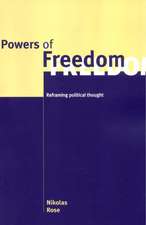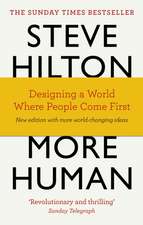The Making of International Human Rights: The 1960s, Decolonization, and the Reconstruction of Global Values: Human Rights in History
Autor Steven L. B. Jensenen Limba Engleză Paperback – feb 2017
| Toate formatele și edițiile | Preț | Express |
|---|---|---|
| Paperback (1) | 227.33 lei 43-57 zile | |
| Cambridge University Press – feb 2017 | 227.33 lei 43-57 zile | |
| Hardback (1) | 696.45 lei 43-57 zile | |
| Cambridge University Press – 8 feb 2016 | 696.45 lei 43-57 zile |
Din seria Human Rights in History
-
 Preț: 232.45 lei
Preț: 232.45 lei -
 Preț: 277.57 lei
Preț: 277.57 lei -
 Preț: 286.30 lei
Preț: 286.30 lei -
 Preț: 230.61 lei
Preț: 230.61 lei -
 Preț: 230.10 lei
Preț: 230.10 lei -
 Preț: 232.73 lei
Preț: 232.73 lei -
 Preț: 184.88 lei
Preț: 184.88 lei -
 Preț: 312.46 lei
Preț: 312.46 lei -
 Preț: 255.09 lei
Preț: 255.09 lei -
 Preț: 242.08 lei
Preț: 242.08 lei -
 Preț: 276.61 lei
Preț: 276.61 lei -
 Preț: 201.76 lei
Preț: 201.76 lei -
 Preț: 281.30 lei
Preț: 281.30 lei -
 Preț: 232.24 lei
Preț: 232.24 lei -
 Preț: 310.51 lei
Preț: 310.51 lei - 8%
 Preț: 564.42 lei
Preț: 564.42 lei - 9%
 Preț: 593.66 lei
Preț: 593.66 lei -
 Preț: 194.09 lei
Preț: 194.09 lei -
 Preț: 230.51 lei
Preț: 230.51 lei - 14%
 Preț: 895.53 lei
Preț: 895.53 lei - 11%
 Preț: 597.10 lei
Preț: 597.10 lei -
 Preț: 320.75 lei
Preț: 320.75 lei -
 Preț: 216.39 lei
Preț: 216.39 lei -
 Preț: 280.74 lei
Preț: 280.74 lei -
 Preț: 288.42 lei
Preț: 288.42 lei - 14%
 Preț: 757.85 lei
Preț: 757.85 lei - 11%
 Preț: 600.84 lei
Preț: 600.84 lei -
 Preț: 264.74 lei
Preț: 264.74 lei -
 Preț: 233.22 lei
Preț: 233.22 lei -
 Preț: 327.51 lei
Preț: 327.51 lei -
 Preț: 272.75 lei
Preț: 272.75 lei - 11%
 Preț: 537.58 lei
Preț: 537.58 lei -
 Preț: 288.25 lei
Preț: 288.25 lei - 14%
 Preț: 708.38 lei
Preț: 708.38 lei -
 Preț: 225.97 lei
Preț: 225.97 lei
Preț: 227.33 lei
Nou
Puncte Express: 341
Preț estimativ în valută:
43.50€ • 45.53$ • 36.21£
43.50€ • 45.53$ • 36.21£
Carte tipărită la comandă
Livrare economică 31 martie-14 aprilie
Preluare comenzi: 021 569.72.76
Specificații
ISBN-13: 9781107531079
ISBN-10: 1107531071
Pagini: 326
Ilustrații: 11 b/w illus.
Dimensiuni: 153 x 230 x 20 mm
Greutate: 0.48 kg
Editura: Cambridge University Press
Colecția Cambridge University Press
Seria Human Rights in History
Locul publicării:New York, United States
ISBN-10: 1107531071
Pagini: 326
Ilustrații: 11 b/w illus.
Dimensiuni: 153 x 230 x 20 mm
Greutate: 0.48 kg
Editura: Cambridge University Press
Colecția Cambridge University Press
Seria Human Rights in History
Locul publicării:New York, United States
Cuprins
Introduction; 1. 'Power carries its own conviction': the early rise and fall of human rights, 1945–60; 2. 'The problem of freedom': the United Nations and decolonization, 1960–1; 3. From Jamaica with law: the rekindling of international human rights, 1962–7; 4. The making of a precedent: racial discrimination and international human rights law, 1962–6; 5. 'The hymn of hate': the failed convention on elimination of all forms of religious intolerance, 1962–7; 6. 'So bitter a year for human rights': 1968 and the UN International Year for Human Rights; 7. 'To cope with the flux of the future': human rights and the Helsinki Final Act, 1962–75; 8. The presence of the disappeared, 1968–93; Conclusion.
Recenzii
'Based on an impressive range of multinational archival and published primary sources, as well as on a solid reading of the relevant body of research literature, this book is a valuable and impressive contribution to international historical scholarship on the evolution of international human rights norms and their codification as international law in the twentieth century.' Jay Winter, Yale University, Connecticut
'Steven L. B. Jensen offers a fundamentally new interpretation of international human rights history, and his book will make a major contribution to this emerging field. The book is based on an impressive body of research in a wide range of countries and archives. This is a truly important work.' Sarah Snyder, American University, Washington DC
'This book makes a significant and, in many respects, highly novel contribution to the field. Crucially, it represents one of the few recent works that seeks to address the 1960s. The author gives ample reason to revisit this decade and, consequently, to rebalance the relative importance of the two favored decades of human rights historiography, the 1940s and 1970s. It is a work that complements the current state of the art.' Roland Burke, La Trobe University, Victoria
'… the most comprehensive counter-narrative produced to date. Making use of archive collections in ten nations … Jensen convincingly argues that the Global South is an active and formative player in the diplomatic negotiations regarding human rights. In addition, his illustration of how human rights became a discursive tool … provides an important counterbalance to notions of a Cold War that provided no space beyond the US-Soviet binary. … readers will particularly appreciate his skill at recreating complex diplomatic moments, and translating legal documents, meeting notes, and policy reforms into readable and frankly, riveting chapters. Not only does Jensen's work unsettle the entire narrative of human rights history, but he also in fact requires modern historians to step back and reevaluate virtually every diplomatic development in the postwar era. This work is a critical and long-needed intervention in human rights history, diplomatic history, and indeed, modern world history.' Samantha Christiansen, H-Diplo
'Jensen pursues two aims: to include the 1960s into the historiography on human rights and to highlight the contributions made by a number of states from the Global South, especially Jamaica and Liberia. … Jensen has written a well researched and solid book.' Philipp Kandler, Global Histories: A Student Journal
'Steven L. B. Jensen offers a fundamentally new interpretation of international human rights history, and his book will make a major contribution to this emerging field. The book is based on an impressive body of research in a wide range of countries and archives. This is a truly important work.' Sarah Snyder, American University, Washington DC
'This book makes a significant and, in many respects, highly novel contribution to the field. Crucially, it represents one of the few recent works that seeks to address the 1960s. The author gives ample reason to revisit this decade and, consequently, to rebalance the relative importance of the two favored decades of human rights historiography, the 1940s and 1970s. It is a work that complements the current state of the art.' Roland Burke, La Trobe University, Victoria
'… the most comprehensive counter-narrative produced to date. Making use of archive collections in ten nations … Jensen convincingly argues that the Global South is an active and formative player in the diplomatic negotiations regarding human rights. In addition, his illustration of how human rights became a discursive tool … provides an important counterbalance to notions of a Cold War that provided no space beyond the US-Soviet binary. … readers will particularly appreciate his skill at recreating complex diplomatic moments, and translating legal documents, meeting notes, and policy reforms into readable and frankly, riveting chapters. Not only does Jensen's work unsettle the entire narrative of human rights history, but he also in fact requires modern historians to step back and reevaluate virtually every diplomatic development in the postwar era. This work is a critical and long-needed intervention in human rights history, diplomatic history, and indeed, modern world history.' Samantha Christiansen, H-Diplo
'Jensen pursues two aims: to include the 1960s into the historiography on human rights and to highlight the contributions made by a number of states from the Global South, especially Jamaica and Liberia. … Jensen has written a well researched and solid book.' Philipp Kandler, Global Histories: A Student Journal
Notă biografică
Descriere
This book reinterprets the history of international human rights by arguing that the 1960s were crucial to their breakthrough.












